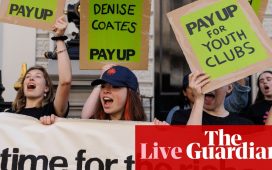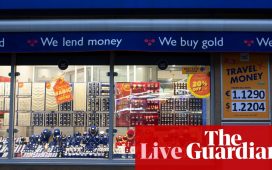Introduction: Bond fund giant Pimco warns of ‘hard landing’ for UK economy
Good morning, and welcome to our rolling coverage of business, the financial markets and the world economy.
The ghost of a future recession is haunting the UK this morning, with less than a fortnight until the new year.
One of the world’s biggest active bond fund managers has dampened the festive mood, warning that the UK is at high risk of a serious economic downturn in 2024.
Daniel Ivascyn, chief investment officer at Pimco, is predicting the UK will suffer greater economic strain than the US economy next year, when both countries will be holding general elections.
Ivascyn told the Financial Times that higher interest rates are having more of an impact on British consumers than their American counterparts.
“In the case of the UK — a smaller, open economy, with a consumer that’s feeling the brunt of central bank policy far more than their US counterparts — you just have a higher probability of more significant economic deterioration.
“We do think there’s potentially more hard landing risks.”
Ivascyn also warns that Europe’s economy could also struggle in 2024, adding that both the UK and Europe risk “a more significant deterioration” than the US, whose economy had held up well in 2023. More here.
Both the US and UK central banks have left interest rates on hold in recent months – at 5.25% in the UK, and a 5.25-5.5% target range in the US.
Optimism has been growing in recent weeks that the US will pull off a tricky ‘hard landing’ – bringing down inflation without triggering a recession.
That would allow the Federal Reserve to ease policy in 2024, with the markets pricing in as many as six quarter-point cuts to US interest rates next year.
But the Bank of England continues to push back against market expectations that it might cut interest rates by over one percentage point next year.
Last week, accountancy and business advisory firm BDO reported that UK business confidence has fallen three months running, driven by gloom in the services sector. BDO’s optimism index fell to its weakest point since April, with rising wages forcing firms to cut back on hiring.
Worryingly, the UK economy shrank by 0.3% in October, suggesting it weakened towards the end of 2023.
On Friday, updated GDP data will show how the UK economy performed in July-September. It will probably confirm that GDP stagnated, but there is chatter that the data could be downgraded to show the economy shrinking in Q3.
Looking more widely, analysts at Oxford Economics predict that global GDP growth will slow to just 2.1% next year – a weak outcome even by post-global financial crisis standards.
They add:
However, it would still amount to a soft economic landing after the aggressive monetary policy tightening over the past couple of years.
Also coming up today
New eurozone inflation data is expected to confirm that consumer prices rose more slowly in November, to a 28-month low. The initial estimate was that the eurozone CPI rose by 2.4% over the last year, as inflation cooled.
In the UK parliament, the Business and Trade Committee is holding an evidence session examining the use of private equity in the retail sector. Asda co-owner Mohsin Issa will be among the witnesses.
The agenda
-
10am GMT: Eurozone inflation report for November (final estimate)
-
10am GMT: Business and Trade Committee session on use of private equity in retail sector
-
11am GMT: CBI Industrial Trends survey of UK manufacturing
-
1pm GMT: Bank of England deputy governor Sarah Breeden: Speech at the IIF talking policy series
Key events
In the City, the FTSE 100 share index is shrugging off concerns over the UK’s economic prospects.
The blue-chip index has gained 22 points or 0.3% to 7,637 points, towards the three-month high set last week.
Grocery technology group Ocado (+3.1%) is the top riser, at the highest since mid-September, as it continues its recent rally.
This follows fresh gains on the New York stock market last night, as Steve Clayton, head of equity funds at Hargreaves Lansdown, explains:
“The bulls were running on Wall Street last night, with stocks powering to a new highpoint. The S&P index of leading US stocks rose 0.5% to close at 4,741 its highest level so far in 2023 and within a whisker of the all-time record reached at the beginning of 2022.
Tech stocks led the way with most of the Magnificent Seven group of mega-cap tech names pushing higher. Adobe gained almost 3%, despite having to drop its $20bn pursuit of Figma after UK and European regulators opposed the deal.
Beyoncé and Blondie song fund Hipgnosis delays results amid valuation concerns

Julia Kollewe
The woes of Hipgnosis Songs Fund, which owns the streaming rights to artists ranging from Beyoncé to Neil Young, have deepened, as it delayed the publication of its half-year results at the last minute.
Hipgnosis said it was postponing its results because the company valuation by its independent valuer was “materially higher” than the valuation implied by proposed and recent transactions in the sector, in particular its recent sale of a chunk of song rights at a steep discount.
The fund sold 20,000 “non-core” songs for $23.1m (£18.4m), at a 14% discount to their previous valuation, last week.
Shares in Superdry have tumbled around 20% in early trading, to a record low, after it issued a profit warning this morning.
They’ve fallen to 33.8p, an alltime low, down from 41.8p last night.
The shares floated at 500p in 2010, and peaked at £20 at the start of 2018, before sliding in recent years.
It made a loss of £148m last year, and in September took out a pricy loan from specialist retail investor Hilco, at an interest rate of 10.5% plus the Bank of England base rate.
Google to pay $700m in Play app antitrust settlement
Google has agreed to pay $700m and to allow for greater competition in its Play app store, according to the terms of an antitrust settlement with US states and consumers disclosed in a San Francisco federal court.
Google was accused of overcharging consumers through unlawful restrictions on the distribution of apps on Android devices and unnecessary fees for in-app transactions. It did not admit wrongdoing.
The company will pay $630m into a settlement fund for consumers and $70m into a fund that will be used by states, according to the settlement, which still requires a judge’s final approval.
The settlement said eligible consumers will receive at least $2 and may get additional payments based on their spending on Google Play between 16 August 2016 and 30 September 2023.
Superdry warns ‘challenging trading conditions’ will hit profits
UK retailer Superdry has added to the gloom, by warning that its autumn sales were weaker than expected.
Superdry blamed the “challenging consumer retail market” and the “abnormally mild” weather, as it reported a 13.1% fall in retail sales, year-on-year, in the first half of its financial year.
This “challenging trading environment” will hit Superdry’s profitability this financial year.
Julian Dunkerton, founder and CEO of Superdry, says:
“The unseasonal weather through the early autumn led to a delayed uptake of our Autumn/Winter range and this impacted sales in the first half of the year.
Whilst we have seen modest signs of improvement through the recent spell of colder weather, current trading has remained challenging, and this is reflected in the weaker than expected business performance.
The operational progress we have made in the first half has been more encouraging with the IP sale for the South Asian region and strong progress on our cost efficiency programme.”
Introduction: Bond fund giant Pimco warns of ‘hard landing’ for UK economy
Good morning, and welcome to our rolling coverage of business, the financial markets and the world economy.
The ghost of a future recession is haunting the UK this morning, with less than a fortnight until the new year.
One of the world’s biggest active bond fund managers has dampened the festive mood, warning that the UK is at high risk of a serious economic downturn in 2024.
Daniel Ivascyn, chief investment officer at Pimco, is predicting the UK will suffer greater economic strain than the US economy next year, when both countries will be holding general elections.
Ivascyn told the Financial Times that higher interest rates are having more of an impact on British consumers than their American counterparts.
“In the case of the UK — a smaller, open economy, with a consumer that’s feeling the brunt of central bank policy far more than their US counterparts — you just have a higher probability of more significant economic deterioration.
“We do think there’s potentially more hard landing risks.”
Ivascyn also warns that Europe’s economy could also struggle in 2024, adding that both the UK and Europe risk “a more significant deterioration” than the US, whose economy had held up well in 2023. More here.
Both the US and UK central banks have left interest rates on hold in recent months – at 5.25% in the UK, and a 5.25-5.5% target range in the US.
Optimism has been growing in recent weeks that the US will pull off a tricky ‘hard landing’ – bringing down inflation without triggering a recession.
That would allow the Federal Reserve to ease policy in 2024, with the markets pricing in as many as six quarter-point cuts to US interest rates next year.
But the Bank of England continues to push back against market expectations that it might cut interest rates by over one percentage point next year.
Last week, accountancy and business advisory firm BDO reported that UK business confidence has fallen three months running, driven by gloom in the services sector. BDO’s optimism index fell to its weakest point since April, with rising wages forcing firms to cut back on hiring.
Worryingly, the UK economy shrank by 0.3% in October, suggesting it weakened towards the end of 2023.
On Friday, updated GDP data will show how the UK economy performed in July-September. It will probably confirm that GDP stagnated, but there is chatter that the data could be downgraded to show the economy shrinking in Q3.
Looking more widely, analysts at Oxford Economics predict that global GDP growth will slow to just 2.1% next year – a weak outcome even by post-global financial crisis standards.
They add:
However, it would still amount to a soft economic landing after the aggressive monetary policy tightening over the past couple of years.
Also coming up today
New eurozone inflation data is expected to confirm that consumer prices rose more slowly in November, to a 28-month low. The initial estimate was that the eurozone CPI rose by 2.4% over the last year, as inflation cooled.
In the UK parliament, the Business and Trade Committee is holding an evidence session examining the use of private equity in the retail sector. Asda co-owner Mohsin Issa will be among the witnesses.
The agenda
-
10am GMT: Eurozone inflation report for November (final estimate)
-
10am GMT: Business and Trade Committee session on use of private equity in retail sector
-
11am GMT: CBI Industrial Trends survey of UK manufacturing
-
1pm GMT: Bank of England deputy governor Sarah Breeden: Speech at the IIF talking policy series







